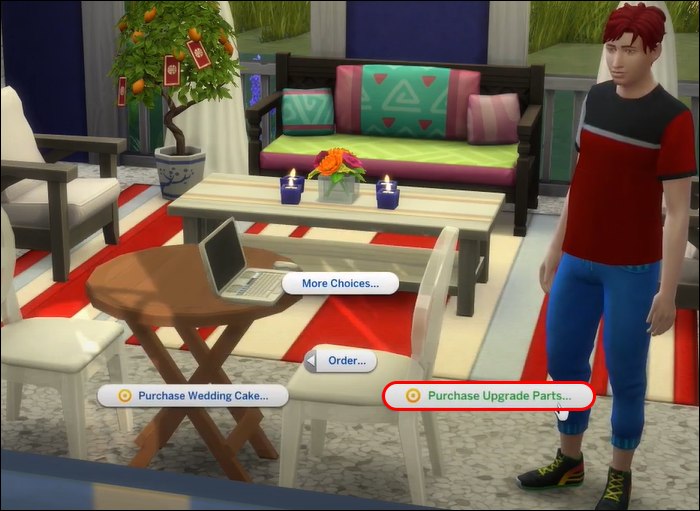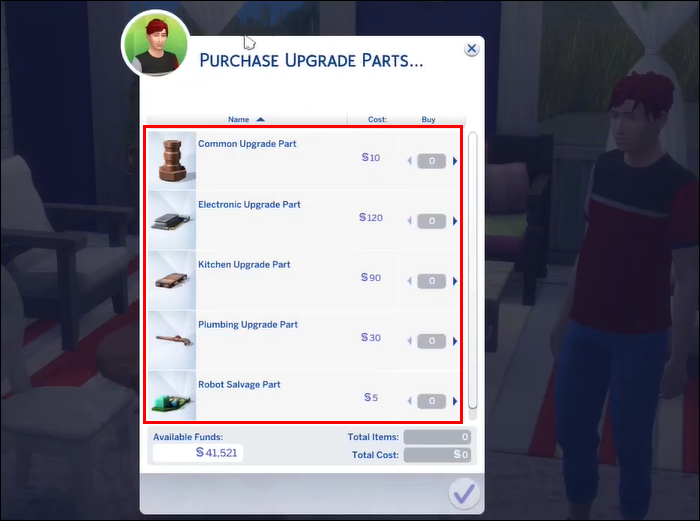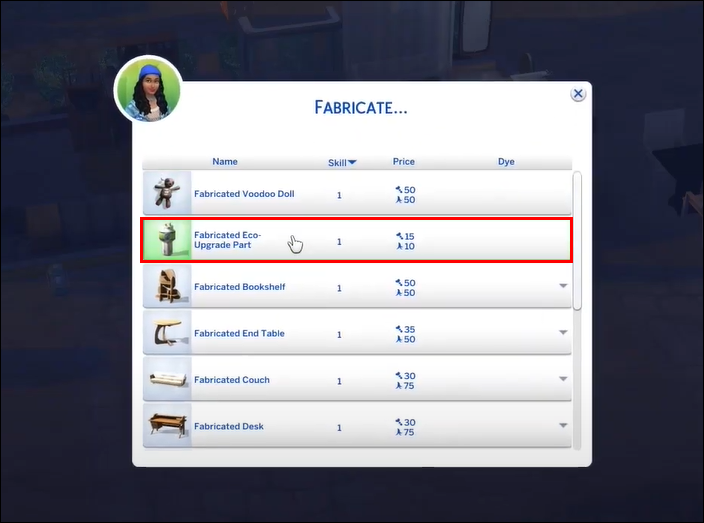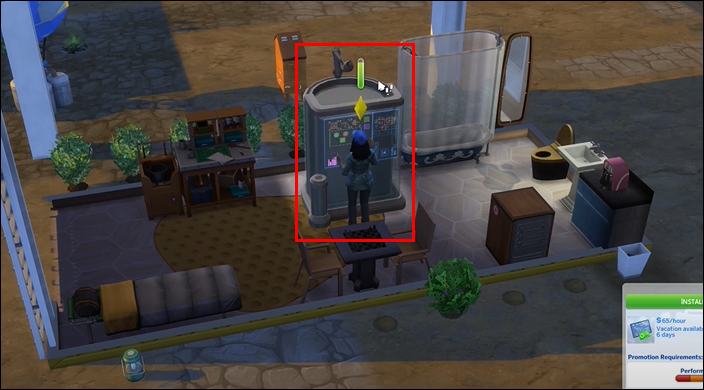In the Sims 4, upgrade parts are used to improve kitchen appliances, electronics, plumbing, animal sheds, coops, and other things. Your handiness skills can be improved by repairing broken objects, especially when a Sim lacks the funds for handyman services in the base game. With enough skills, devices, and equipment already owned can be upgraded. However, you need some upgrade parts to make use of this option. Read on to learn more about getting upgrade parts on Sims 4.
Getting Upgrade Parts for the Base Game Items
In the Sims 4 base game, you can get upgrade parts. The upgrade parts can be ordered, or you can repair some broken items. To upgrade by buying, you need to:
- Choose “Buy upgrades.”

- Select the parts you want to buy.

- Confirm the choice made. This will upgrade the parts, and they’ll be available in the Sims equipment.

There are different upgrade parts, including those for electronic devices, plumbing, and kitchen appliances.
Repairing and Upgrading Items in the Base Game
Your Sim can also repair objects when they break down in your house to get more upgrade parts. Once an item has been repaired, a trash pile is shown next to that item. You can select that pile and choose “Scavenge for parts” to get more upgrade parts.
Your Sim can upgrade parts, including fridges, computers, beds, and TV sets. “Death by Murphy” bed can be avoided by making the beds unbreakable by adding the “Reinforced Spring Wiring” feature.
If you choose to upgrade parts using your computer, you’ll realize it’s an expensive option compared to scavenging for parts after broken devices and objects have been repaired. If your Sim has very low handiness skills, they can get electrocuted should they attempt to repair electronic devices that have broken down. This leads to a Dazed Moodlet.
If the Sim attempts to repair another device in the Dazed Moodlet, they get a second electrocution. In this case, the Sim will die.
Boost Handiness Skills to Access Upgrade Parts
You can’t get a specialist to fix your things when you lack funds. You need to repair any broken equipment on your own. To do this, you need a certain level of handiness. Thankfully, this skill can be increased and is an excellent way to save money.
The skill is essential and helps you fix devices and equipment. If you are on a higher level, the devices can be upgraded and modernized to make them less likely to fail. Learning handiness involves clicking on the damaged appliances and attempting to fix them.
The skill can be further leveled up by fixing another appliance. You can either upgrade or receive extra parts from the piles. The parts salvaged can be used in other operations later. Kitchen and electronic devices can be upgraded in lower levels, while electronics can be upgraded in higher ones. Click on different objects to see if there is an “Upgrade Option.”
Handiness can be improved through woodworking. You can boost handiness levels by creating different types of objects. At the lower levels, you start with small decorations and then upgrade as you move higher. Handiness skills in woodworking let you utilize the “Woodworking Table” to create decorative sculptures, toilets, baths, chairs, and tables. These can be sold, with the best crafts fetching a higher price.
If it’s impossible to select an unlocked upgrade option, this means you don’t have all the necessary parts.
Getting Eco Upgrade Parts in Eco Lifestyle
The eco fabricator can create upgrade parts if installed in the Eco Lifestyle. To do so:
- Get the “recipe” for your target upgrade parts.

- Navigate to the fabricator and begin creating the upgrade parts.

The fabricator might break down randomly, but it can be fixed quickly. All household appliances should be upgraded to ensure Port Promise is green. To make this happen, eco-upgrade parts are needed for the task.
Get Eco-Upgrade Parts by Using the Debug Catalog or Dumpster Dive
You may find eco-upgrade parts while dumpster diving. This is not guaranteed, but there is a chance that you should take advantage of it. An alternative to this is getting the upgrade parts for 50 Simoleons from the debug catalog. To access this:
- Press the shift, C, and Ctrl.

- Type in “testing cheats true,”

- Enter “bb.showhiddden objects.” This allows you to access the catalog. You can then pick the parts you need to use.

Eco lifestyle introduces multiple ways in which energy can be conserved. Your lot can also be converted into an environmentally friendly area if it’s an industrial wasteland. You can do this by getting solar panels and wind turbines. However, these must be utilized to their best potential after being upgraded.
In the eco upgrade option, you may use the fabricator. Here, you need to use 10 pieces (banana icon) and 15 bits (screw icon). You can create a single upgrade part for every successful attempt made. Since the attempts could fail, be ready to use more pieces and bits.
If you are unsure about the cost of each, go to the bottom of your screen and hover over your household funds. Look at the extra numbers with banana and screw icons. These show the number of pieces and bits needed. Dumpster diving is the other option that can be used. Find a dumpster in the
Sims world and select “Dive for deals.” There is no guarantee that you will get anything, but there is a chance of getting pieces and bits, dyes, or old furniture instead.
You can purchase a dumpster and dive in if it’s filled up. Go to the Waterfront in the Evergreen Harbors industrial district for more options.
Cottage Living: Getting Livestock Upgrade Parts
To access this upgrade, you need Cottage Living Expansion installed. To get the parts, consider running different errands for the Henford-on-Bagley villagers. Running errands for Henford-on-Bagley Sims earns you the livestock upgrade parts. To run such errands, you need to interact with NPC in the Sims world and select “Offer Help with Errands.” This option is located in the Friendly Conversation menu. Three errands can be accepted simultaneously.
The possible errands that your Sim can run include planting specific crops. Every request comes with a reward. For livestock upgrade parts, select the errands that have such rewards on completion.
Coop and Animal Shed Upgrades
Using the Livestock Upgrade Parts, your Sim can upgrade their chicken coop and animal shed. There are different upgrades here, and each of them comes with its perks. Building upgrades are handled one at a time.
If you want to upgrade the coop or animal shed:
- Select the Coop or Animal Shed and click.

- Select “Actions” and “Upgrade.” You will get a list of all the upgrades available for your selected
building. Hovering over any option lets you know the parts needed for that upgrade.
In the animal shed, you can access two upgrade options. These are:
- ComfortCare life extenders extend the Llama and Cow’s lifespan. You need three parts to access this upgrade.
- Livestock Auto Feeder. Here, the animal shed feed is automatically refilled forever. You’ll need six livestock upgrade parts to access this.
For the chicken coop, there are three possible upgrades.
- ComfortCare Extender: This extends the chicken’s lifespan. You need two upgrade parts to affect it.
- Livestock auto feeder: This upgrade automatically dispenses feed forever. You need six livestock upgrade parts for this.
- Fox-Be-Gone Alarm: With this option, foxes are prevented from attacking the chicken coop. This requires three upgrade parts.
Get the Best Out of Sims 4 With Upgrade Parts
Getting upgrade parts in Sims 4 can help you elevate your experience and gameplay. It makes it more exciting and allows your Sim to access even more possibilities. The accessibility of the upgrade parts depends on the money and skills you have.
Have you encountered any issues accessing upgrade parts on Sims 4? Did the information provided in this article help? Let us know in the comments section below.
Disclaimer: Some pages on this site may include an affiliate link. This does not effect our editorial in any way.




















